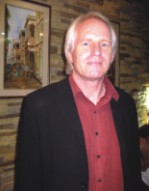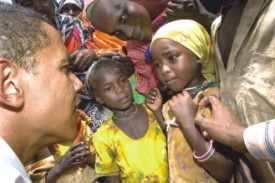Interview
Films about Social Change
Ershad Kamol
 |
Bob Hercules |
Hollywood is known for churning out blockbusters that the whole world eagerly sees but besides the big names in the industry a significant number of independent filmmakers are making movies in the US. These movies deal with socio-political issues, a rare phenomenon in mainstream Hollywood films. Usually such filmmakers individually raise the funds to make their documentaries and films, which are gaining popularity in the US and beyond.
Bob Hercules, for instance, an independent filmmaker has made quite a name across the world for making some innovative documentaries such as Forgiving Dr Mengele and Senator Obama Goes to Africa. Hercules' works have been broadcast widely on PBS, the Discovery Channel, IFC, The Learning Channel and through television syndication nationwide. Last month, this award-winning producer/director and co-owner of Media Process Group, a Chicago-based production company, visited Dhaka to participate in the 11th Dhaka International Film Festival organised by Rainbow Film Society. Three of his documentaries-- Forgiving Dr. Mengele, Senator Obama Goes to Africa and The Road to Haymarket-- were screened at the festival.
His documentary Forgiving Dr. Mengele has been screened in many theatres in the US and has been widely acclaimed globally. The film won the Special Jury Prize at the 2006 Sundance Film Festival and the Crystal Heart Award at the 2006 Heartland Film Festival. The film is based on forgiving an infamous Nazi doctor Josef Mengele, who conducted sadistic experiments on human beings at Auschwitz concentration camp during World War II, by two victims at the concentration camp. His documentary Senator Obama Goes to Africa, a chronicle of Obama's momentous 2006 diplomatic trip to Africa, including a stop at his late father's homeland near Kisumu, Kenya, was released on DVD by First Run Features and has run on television stations in over 100 countries.
As a documentary filmmaker Hercules always focuses on well-discussed socio-political issues such as racism, civil war and poverty by making the documentary based on a biography or a journey of a period of the iconic characters.
 |
 |
| A still from the documentary Senator Obama Goes to Africa, directed by Bob Hercules. |
Kenyans welcome Obama enthusiastically on his visit to his ancestral home in Kenya. |
"I love dealing with such themes," says Bob Hercules, " Since my early age I've been interested in political issues. I've been interested in history and social change. When I started to make films after completing MA in cinema, I wanted to incorporate all of my interests in my films. That's why I'm interested in the subjects that have been pushing the society and have been agitating the society."
In fact, it was his first visit to Bangladesh. "Earlier my films participated in festivals arranged in some developing countries in Africa, but this is the first time I'm participating in a festival organised in a developing country with three of my popular documentaries," Hercules says.
He further adds, "I love this country. Like the other developing countries Bangladesh also has some challenges, however, people here are phenomenal. It's a very lively, friendly and bustling place. I found they had been very receptive to my films. The festival here is a joyful experience to me. It's great. It's a new experience for me."
 |
| Protagonist Eva Mozes Kor who forgives the Nazi doctor in the documentary titled Forgiving Dr Mengele. |
Of the films made by Hercules, he considers Forgiving Dr. Mengela, as his best work. "It really touches people. It is based on a true story of Eva Mozes Kor, the Jewish girl who survived from the infamous Auschwitz concentration camp during the second World War II. Her decision to forgive the perpetrators as an act of self-healing sparked a firestorm of criticism, however, to me it was a noble act for reconciliation, which are important factors to keep the world in peace."
Why had you made a documentary on Barack Obama? Hercules replies, " His main adviser David Axelrod, an American political consultant based in Chicago, and I had worked in some documentary films together. In spring 2006, he informed me that Obama was going to Africa to visit his ancestor's village in the coming August. I thought it was a great idea to make a documentary and personally I collected money for making the film and went there with Obama's family for a three-week visit. I spent the whole time with Obama and partly with his family."
"Obama was surprised seeing the number of people enthusiastically receiving him. He is a very impressive person. He is very good in talking to people and inspiring them. He even did an AIDS test in public just to encourage the men (to do the same). It had a great public impact," he adds. The documentary has certain messages such as challenges that people in Africa are facing such as AIDS, corruption, poverty, refugee, civil war and lack of empowerment of the people, informs Bob Hercules.
Bob Hercules is also planning to make a documentary in Bangladesh. "Commissioned by others so far I've made a couple of films on micro credit. I know Grameen Bank in Bangladesh has initiated it. I have a plan to make a documentary on how it's working in Bangladesh. It's a very interesting and important story for me.”
Copyright
(R) thedailystar.net 2010 |
